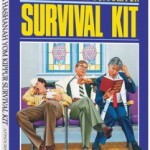Surviving your synagogue
 Since we’re here we intend to survive. It’s a human instinct to say Gam zeh ya’avor – “This too will pass”.
Since we’re here we intend to survive. It’s a human instinct to say Gam zeh ya’avor – “This too will pass”.
It especially comes into play when things are tough – rocky times in the economy, business, crises in the family, illness, worry or fear… We say, “Somehow we’ll get through!” Sometimes we do, sometimes we’re simply not strong or lucky enough.
A few years’ ago, someone thought up a new angle; they issued a “Rosh HaShanah/Yom Kippur Survival Kit”. Earlier, “The Jewish Catalogue” printed a piece called “How to Survive Your Synagogue”.
Surviving the High Holydays and Surviving Your Synagogue go together. Can one come to shule on yom-tov and survive it? That’s the question.
There is a level on which it is physically bruising to push past other congregants, tripping over their feet as they sit in cramped, uncomfortable seats, only to find a gatecrasher in your place and vent on them your anger at having to be there in the first place.
And if your seat is actually vacant you still have your problems – a dreary service, a predictable sermon, a disastrous choir, a clock that slows down every year on Rosh HaShanah/Yom Kippur – talk about survival of the fittest!
All this is fair enough. But I don’t think this is what the “Survive Your Synagogue” campaign is really all about, and I feel sad.
Sad that anyone presumes that as the prophet says, “There is no balm in Gil’ad” (Jer. 8:22), that there is no spirituality in the synagogue and no-one who wants it, that the prayers are just a performance and the crowds aren’t interested in prayer and piety in any case.
What an indictment – of the synagogue, the congregation and Judaism.
The official principle is simple – enter the synagogue and receive automatic inspiration. Forget about tuning in. Don’t bother your mind with the themes of these days, close off your soul and spirit so that nothing can penetrate, tell yourself it’s all a penance that has to be endured.
There was a time when I used to advise people to day-dream during the service, to ignore the prayers and think about themselves, their lives, their environment, their Jewishness – whatever.
I now realise there is a danger in that approach: it suggests that the service is really irrelevant, the same self-scrutiny could happen anywhere, and you could just as well stay home from shule altogether.
I no longer feel that way. Yes, I still day-dream, but only at odd moments. Instead, I let the prayers shape my spiritual agenda. I surf the crests of the liturgical waves.
I meet God the Most High, and man the egotistical upstart; God the One who remembers and records, and man as the one whose every deed is scrutinised; God the Redeemer, and man who can bring the redemption; life as the great opportunity and Judaism as the great idea.
The prayers give me direction: a God to speak to, a God to respond. They give me cadence: words and phrases to say what needs to be said. They give me a Jewish past and destiny.
I am so busy that I have no time to worry about surviving my synagogue.



